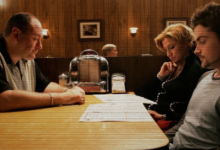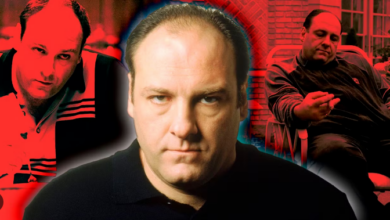‘The Sopranos’ Meaning for Gabagool Is a Lot Darker Than You Thought

If you are an Italian-American, especially in the Tri-State area, you’re familiar with the slang terms we sometimes use to describe our favorite foods, like “muzzadell” (mozzarella), “rigot” (ricotta) and “proshut” (prosciutto).Most famously, though, the slang term “gabagool” exploded into pop culture, thanks to the HBO hit series The Sopranos. Tony Soprano’s (James Gandolfini) love for the thinly sliced cured meat, gabagool (cappicola) is probably one of the most famous details about the iconic character. However, in the series, gabagool has a deeper and much darker meaning derived from a traumatic experience in Tony’s childhood.
Tony Has a Traumatic Connection to Satriale’s Meat Market in ‘The Sopranos’ Season 3

In the Season 3 episode of The Sopranos, “Fortunate Son,” Dr. Melfi (Lorraine Bracco) is helping Tony get to the bottom of his most recent panic attack. She starts to see an odd connection between Tony’s anxiety attacks and meat. The panic attack that brought him to Dr. Melfi in the first place happened when he was grilling sausages, and the most recent one occurred while he was making a sandwich. Later in the episode, Tony is enjoying a delicious slice of gabagool from the fridge when he’s hit with a panic attack. He recalls a memory from when he was 11 years old, the first time he had an episode. Earlier that day, young Tony (Mark Damiano II) witnessed a truly brutal moment when his father, Johnny Boy (Joseph Siravo) and his Uncle Junior (Rocco Sisto) beat up the owner of the meat shop, Mr. Satriale (Lou Bonacki).
Although Tony’s father told him not to follow him inside, the young boy didn’t listen and walked in on his father chopping Mr. Satriale’s fingers off with a meat cleaver over an unpaid debt. While this would be traumatic for anyone to see, something Dr. Melfi points out, it left a particularly deep scar on young Tony. That night, when his father carved into the roast for dinner, Tony broke out into a cold sweat and “fainted,” hitting his head on the kitchen floor. From that moment on, his trauma became inextricably linked to Satriale’s Meat Market, the very place Tony would later frequent as an adult, buying meat to feed his family.
Eating Gabagool Triggers Tony’s Panic Attacks on ‘The Sopranos’

As Tony delves further into the memory with Dr. Melfi, she confirms that Tony’s experience that day was, in fact, his first panic attack and that it now makes sense why meat triggers him. She also suggests that the meat symbolizes his father’s violent work, which was condoned by his mother, who cooked the meat he would bring home for free. Perhaps Tony’s anxiety stemmed from the fear that one day, he would have to live up to his father’s violent legacy. Even though Tony tries to downplay it, not wanting to think that deeply about “a slice of gabagool,” Dr. Melfi stresses that understanding the root cause of his anxiety is key to preventing future episodes.
Despite this breakthrough with Dr. Melfi, Tony has no desire to change the lifestyle that makes him Tony Soprano. He certainly isn’t going to stop eating gabagool, and his stubborn mindset about being a gangster keeps him from making any real progress in therapy. His deep connection to his father and the sense of power his work brings him is a recurring theme in The Sopranos, and this dynamic is underscored as Tony grapples with his trauma. The therapy scenes with Tony and Dr. Melfi are some of the most iconic of the whole series, but the ones in “Fortunate Son” stand out as particularly impactful.
While it’s unfortunate that Tony never fully breaks free from the same dangerous patterns, it is understandable why he isn’t willing to cut gabagool out of his diet. After all, it is a beloved and delicious food, but for Tony, it’s much more than that. The Sopranos writers cleverly use gabagool as a symbol of Tony’s connection to his violent lifestyle, making it a representation of the very thing that keeps him stuck in the same cycle of violence that defined his past, present, and future.



